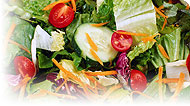Fit and Fast Recipes
Vegetarian Diet

The Basics
Eating a vegetarian diet has been shown in many studies to be healthier than eating a meat-based diet. However, this is not the only reason people choose to go vegetarian: environmental, cultural, religious, and ethical factors all play into the decision to not eat meat.
Vegetarians do not eat meat, poultry, or fish, building their diets mainly on a variety of plant foods:
- Grains: Rice, oats, barley, wheat, quinoa, millet, amaranth, and others. These may be eaten as whole cooked grains, milled into flour and made into grain products like bread, crackers, and pasta, made into puffed or flaked cereals, or sprouted.
- Legumes: Beans, lentils, peanuts, and soy foods. Many soy foods are made through fermentation or culturing. Other legumes are generally eaten cooked, sprouted, or, in the case of peanuts, raw or toasted.
- Nuts and seeds: Examples include almonds, cashews, pecans, hazelnuts, Brazil nuts, pistachios, sesame seeds, sunflower seeds, pumpkin seeds, chia seeds, flax seeds, and hemp seeds (sometimes called hemp hearts). These are generally eaten raw or toasted, but, in the case of seeds, may be sprouted.
- Vegetables and fruits: Both raw and cooked vegetables and fruits are part of a vegetarian diet. Fermented vegetables may also play a role in a vegetarian diet.
Most people who call themselves vegetarians add dairy and eggs to their regular food choices, and they are sometimes called lacto-ovo vegetarians. Vegetarians who include fish in their diet are referred to as pesco-vegetarians. People who eat a mostly vegetarian diet but include small amounts of meat or poultry on occasion may call themselves semi-vegetarians, or flexitarians. Vegetarians who strictly avoid all things derived from animals, eating only plant foods, are known as vegans.
Health benefits may be reaped just by decreasing the amount of meat you eat, even if you don’t decide to follow a fully vegetarian diet.
Ready to veg out? Start by choosing legumes, whole grains, and nuts and seeds to provide the protein, complex carbohydrates, and mono- and polyunsaturated fats you need for healthy functioning of all of the body’s systems. Add to that 5 to 9 servings of fruits and vegetables every day. Regular portions of dairy foods, eggs, or fish as well as soy foods such as tofu, tempeh, and miso are also common staples that add protein and other nutrients to a vegetarian diet.
Copyright © 2026 TraceGains, Inc. All rights reserved.
Learn more about TraceGains, the company.
The information presented by TraceGains is for informational purposes only. It is based on scientific studies (human, animal, or in vitro), clinical experience, or traditional usage as cited in each article. The results reported may not necessarily occur in all individuals. Self-treatment is not recommended for life-threatening conditions that require medical treatment under a doctor's care. For many of the conditions discussed, treatment with prescription or over the counter medication is also available. Consult your doctor, practitioner, and/or pharmacist for any health problem and before using any supplements or before making any changes in prescribed medications. Information expires December 2026.








